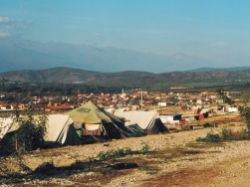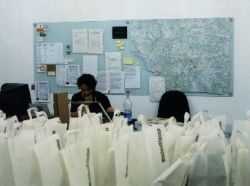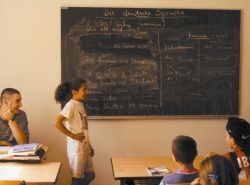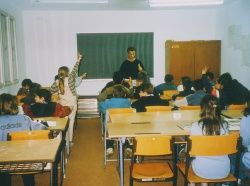Venice (I) * 1999 * La Biennale di Venezia * 20 weeks
Invited as Austria’s contribution to the Biennale di Venezia, WochenKlausur set up language schools in Macedonia for Kosovo-Albanian refugees of the Kosovo War. This financially generously supported project should help to improve the professional qualifications of the refugees.
For five months, WochenKlausur worked in the Austrian pavilion at the 48th Venice Biennial. This international location offered an opportunity involve 200,000 visitors in a project to help refugees of the Kosovo War – a mere 300 km from Venice. Because numerous youthful refugees had found shelter with families in small Macedonian towns and had not had access to any schooling since the war’s outbreak, WochenKlausur decided to establish a network of language schools.
Initially seven spaces were rented on the Kosovo border – around Gostivar and Pristina – and furnished as classrooms. School furniture was provided by the Vienna City School Board, publishers in Austria and Italy assisted with teaching materials, and the University of Vienna sponsored 20 computers. An 18-meter-long semitrailer truck – paid for by Caritas – transported everything to Macedonia in the summer of 1999.
Beyond obtaining furnishings and teaching materials, WochenKlausur had to raise money for salaries and rent. Organizations like KulturKontakt, the Rotary Club of Vienna and the Women’s Initiative Against War, as well as the Veuve Cliquot company and many private individuals, contributed a total of 48,000 euros. The group was able to increase this sum significantly by holding a lottery in the Austrian pavilion at the Biennial: for 20 euros visitors could choose from an array of surprise bags containing prizes sponsored by a variety of Austrian and Italian companies.
The language courses were eventually organized and administered in cooperation with the Macedonian civil rights organization ADI (Association for Democratic Initiatives). Staff member Ardit Misliu drove around in a van provided by the Austrian film production company PPM, visiting all of the schools regularly and delivering the necessary materials. ADI also hired the salaried teachers, who offered courses in English, German, Italian and French. Additionally, Biennial visitor Jeannette Armer, a teacher from Cambridge, spontaneously agreed to teach on a volunteer basis for an entire year.
Upon completing a course, each participant received an official diploma. As a civil rights organization involved in training for NGOs, ADI was certified by government authorities to award these certificates.
Funding was sufficient to operate the language schools for three years. At the end of 2000 the courses in Macedonia were discontinued, because most of the refugee families had returned to Kosovo. Four classes were transferred to Kosovo and ran there for another year.
Anna Artaker, Licia Dragotto, Pascale Jeannée, Stefania Pitscheider, Erich Steurer, Wolfgang Zinggl



